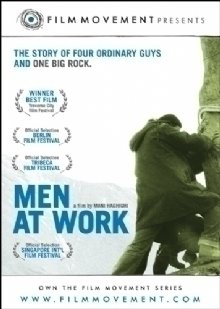
MEN AT WORK
Iran, 2006, 75 minutes, Colour.
Directed by Mani Haghighi.
Men at Work is based on a story by the most celebrated of Iranian film-makers, Abbas Kiarostami. It is an allegory – which may not attract a wide audience. However, it is fascinating as it shows four middle-aged men returning to the capital from a trip to the mountains. They want to return in order to watch a soccer match. However, on the highway, they are confronted by a natural monolith, three metres high, a narrow rock formation, straight out of the ground overlooking a rift. They use all kinds of means to try to move the monolith, enlisting the help of people passing by. The film shows male bonding, male competitiveness, eccentric characteristics – and a lot of talk about their lives, about their relationships. Two of the women actually turn up and are enlisted in the project – much to their lack of interest.
This is the second film by the director who is the son of well-known Iranian personalities and the grandson of a writer and director, Eberahim Golestan.
1.Interesting, entertaining, comic, serious?
2.The director’s indebtedness to Abbas Kierostami? The story? The adaptation of the screenplay? The homages to Kierostami’s style: close-ups from outside the car window, close-ups within the car, cars going up and down mountains?
3.The title, its irony? The men coming from a ski holiday? Making hard work of pushing the rock over the cliff? The uselessness of their enterprise? The personal endeavour? Success at the end or not?
4.The opening, the car windows, the man asleep, the voice-over during the credits of the chatter, about football, about women, sexual relationships, their own histories? The man becoming a grandfather for the first time, the name of the grandchild, western and Iranian? The married man, marrying the younger girl? The men and their comments? Their work, interactions?
5.Driving through the mountains of Iran, the beautiful locations, the desert mountain scenery? The rock and its shape? Standing alone? The challenge for people to push it over? The musical score, the piano background?
6.The men, the story about the Indian and the special place to urinate? Getting out of the car, the man discovering the rock? Calling the men out? Their immediate response, wanting to push it over? Their various attempts at pushing? At digging? At discovering that the rock had no root? Seeing the man with the donkey, the man buying the donkey, the ropes, the threat of the donkey falling over? The old man and his comments about how many had tried, his watching?
7.The passers-by, the man wanting to find the others and getting them to play loud music so that they could meet? The passengers in his car? The young woman? The businessman and his reputation? Their attempts to push? Using their car?
8.The two women arriving, the young bride, the fight with her husband, the talk, their reconciliation and the men betting how long it would take? The older woman, her past relationships and memories, discussions? Her suggestion of getting the lever, going for the chainsaw, wanting to cut down the tree? Getting the tree? Later the man going to get the signpost which had been partly knocked over? His sitting under the shade and his wife finding him?
9.Everybody involved in the attempt? Their failure? The car, the engine, the snapping of the iron, it cutting the man and his injury?
10.The obsessive, his wanting to stay, pushing and digging? The others taking their friend to the clinic, realising they had his coat, turning around? Their sitting in the car?
11.The personalities: the man with the young bride and seeing him with her? His friends’ comments about the unsuitability? The driver, his wife leaving him, going to Paris, selling up, returning – and the news about her terminal illness? The old man becoming a grandfather and his joy? The other man and his obsessiveness?
12.The film’s revelation about character – beginning with the superficial, going deeper?
13.The obsession, the rock – the comments about philosophising? Its symbolism? The transcendent, human effort, human defeat?
14.The ambiguity of the ending – did the rock actually fall or not? Does it matter?